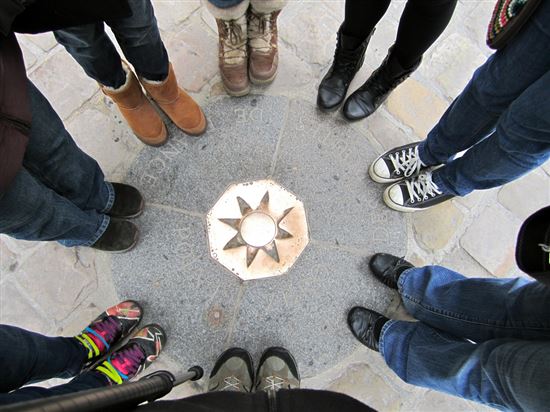23 Ways That Studying Abroad Changes You
Study abroad and your life will never be the same. Here are 23 ways that you'll be forever changed after your study abroad experience.
Every year, American students leave the comfort of their university and choose to study abroad. Consider just how many: 283,332 students studied abroad in 2012, according to the Institute of International Education’s annual census, the Open Doors Report. And the numbers are rising steadily each year.
 |
| © The LEAF Project (CC BY-SA 2.0) via Flickr |
1. You’ll speak at least two languages
One of the most tangible benefits of studying abroad is the acquisition of foreign language skills.
Studying abroad goes far beyond textbooks and language apps and gives you complete immersion. In a study out of the American University Center of Provence, researchers tested American students’ achievement on the TEF, a diagnostic exam used to assess international students’ French abilities, before and after one semester of their study abroad experience. They found that students improved their overall score by 37%. There’s no better way to learn a language than when your survival depends on it, like when you need to ask for directions or you order a meal.
2. You’ll be more well-rounded
Aside from learning the local language, you’ll have a unique opportunity to completely take in a different culture.
You’ll see firsthand their quirks and their commonsense ways of doing things. Studies show that homestays are the best arrangements for language learning and cultural exchange, but the level of one’s immersion really depends on the individual and the level of contact with locals. According to a study conducted by Vija G. Mendelson, a program manager at Academic Programs International (API), many students studying abroad in Spain expressed their hopes of seeing the local culture from a different point of view. But when they returned home, one of their biggest regrets was that they hadn’t interacted with locals as much as they had hoped. If your time abroad is limited, we advise you to seize the moment and make local friends in order to maximize your experience.
3. You’ll become a fascinating person to those around you
You won’t just learn about another culture - you’ll be educating those around you about your culture. Consider yourself a cultural ambassador to your newfound friends. You better know your stuff! What is the national anthem about? Why are Americans so excited about everything? Why do Americans eat so much peanut butter? You may be surprised by how much you know.
4. You’ll be aware of global current events
You’ll don two hats as a cultural ambassador and an informal diplomat for U.S. foreign policy (whether you want to or not!). You might find yourself having to explain American politics or the president’s State of the Union address, even if you don’t completely understand it yourself. Then when you come back, you’ll have to explain current events in your host country to family and friends as well. You may find yourself suddenly interested in topics that previously bored you, and you may adopt a new habit of always keeping up to date on current events. You may do it just to sound knowledgeable or because you now have more context around what’s going on outside the U.S. According to a 10-year study of students studying abroad by University of Georgia researchers, such programs do increase students’ knowledge of global interdependence and political awareness. Many organizations, including NAFSA: Association of International Educators and the American Council on Education, believe that studying abroad should be a national goal for this very reason.
5. You’ll have a greater appreciation for your own culture
Research has shown that people who live in a culture different from their own go through a cycle of emotional adjustment that ranges from a honeymoon phase to culture shock.
When you first arrive in your host country, you’ll be psyched to start your study abroad adventure, but over time, you might start to feel twinges of homesickness. Respondents to the API study reported that they missed the food, language, and customs of their home country — all the things that they had once taken for granted.
6. You’ll never take your friends and family for granted again
Part of the reason for homesickness comes from not having a constant line of communication with your friends and family when you’re miles away.
FOMO, or the fear of missing out, is a real phenomenon, and you’ll feel it even more when you’re on another continent. A friend might celebrate a 21st birthday, a cousin might get married, and you’ll be too far away to participate. The silver lining is that when you come back, you’ll cherish moments with your loved ones even more (and maybe even call your mom back once in a while).
7. You might become an expatriate
In the best-case scenario, you’ll love your host country so much that you’ll find a way to extend your stay past your study abroad program. You might find opportunities in your field of study that can help your career.
The Organisation for Economic Co-operation and Development (OECD) reported that 25% of the students who studied abroad who didn’t renew their student visas changed their status for employment reasons. Even if you don’t stay for the long term, there’s a good chance that you’ll go back for another visit. In the IES survey, 60% of the respondents returned to their host country.
8. You might meet your future spouse
OK, the chances of meeting your future spouse aren’t that high, but it can still happen. You could start a relationship with a local that ends up in a long-term commitment, or you might bond with a fellow study abroad student who can be your partner in fun and learning for the duration of your program.
In the IES survey, 4% of the respondents married someone they met during their study abroad program. That’s a small percentage but an amazing outcome for those former students. You might be one of the lucky few to meet your other half while having the adventure of a lifetime.
9. You’ll always want to travel
Seasoned travelers know – once you’re bitten by the travel bug, it’s hard to turn back.
Even if you don’t end up putting down roots in your adopted country, it’s highly likely that you’ll be traveling again in the near future. In a survey conducted by the International Center of the University of California, San Diego, 95.9% of respondents said that their time studying abroad impacted their interest in travel later on. Before you know it, you might find yourself filling up those blank passport pages with more stamps, stories, and memories.
10. You’ll become more interested in an international career
If you’re already interested in studying abroad, you’ve probably contemplated pursuing an international career, but your study abroad experience will serve as extra motivation.
A study of 198 students at The Kelley School of Business examined this very issue. The researchers found that 83% of students who studied abroad were interested in working internationally, in contrast to only 51% of students who had that interest but had never studied abroad.
11. You could go on an entirely new career path
Maybe you won’t become a diplomat after studying abroad, but you could be inspired to change the direction of your career.
Traveling to another country gives you the opportunity to explore other interests or get some perspective on your future plans. It’s easy to get stuck in the inertia of your college routine, and leaving it all behind might shed some light on what you really want to do with your life. In the IES study, 76% of respondents stated that they learned new skills while abroad that influenced their current career path. And 62% said their experience ignited interest in a career path that they pursued after their study abroad program.
12. You’ll become more independent
Sure, you might be of legal adult age, have your own apartment, and cook your own meals, but you won’t really know what it’s really like to be alone until you have no one but yourself to rely on in a foreign country.
If there’s a problem, you can’t call your parents to fix it because they’re thousands of miles away. If you have a bad day, you can’t call your best friend because she’s fast asleep in another time zone. Suddenly taking a bus cross-country by yourself or planning a weekend getaway won’t be so daunting. In the IES study, 96% of the respondents reported feeling more self-confident after their study abroad experience and 97% felt that they matured and learned something new about themselves.
13. You’ll become a master of negotiating bureaucracy
If you’ve ever had to negotiate with a financial aid officer about your Stafford Loan, then you know what a headache bureaucracy can be.
Now imagine doing that in another country, in a foreign culture, and in a foreign language. In a foreign country, everything’s more complicated, whether it’s making a simple phone call or trying to extend your student visa. Navigating the complicated bureaucracy of another country may be frustrating enough to bring you to tears, but it has its rewards. In the University of Georgia study, researchers found that those who studied abroad had a higher level of functional knowledge, demonstrating that their experience abroad gave them necessary life skills. This will take you a long way in the business world post-graduation.
14. You’ll become more culturally sensitive
It takes an open-minded and adventurous person to leave your hometown and hop a plan for trip that’ll last a month or longer.
However open-minded you might be now, studying abroad has been proven to increase a person’s cultural sensitivity and ability to collaborate with people of other cultures. In the Wabash National Study of Liberal Arts Education, researchers conducted a longitudinal study of 1,593 students and found that studying abroad increases intercultural competence. We live in an increasingly globalized world, and being able to communicate and collaborate with diverse groups of people is priceless, whether at work, school, or in your personal life.
15. You’ll realize just how small the world really is
Google maps and geography textbooks can only do so much. Studying abroad can give context to a political science lecture or language course that books and technology can never replace. Once you’ve made the leap to go overseas, you’ll realize how small the world really is. You’ll also better understand your place in the world.
16. You’ll learn to roll with the punches
In your time studying abroad, you’ll probably have a few moments where your patience is tested and things don’t turn out the way you think they should. Maybe you scheduled a meeting with classmates and nobody showed up on time. Or maybe the laundromat lost your workout pants and the attendant couldn’t be bothered to find them. Living in another country will force you to live by somebody else’s rules around the clock, and you’ll learn to adapt to confusing or frustrating situations. In a Rand survey of 135 human resource managers, 90% agreed that applicants who had study abroad experience were more likely to be flexible, a talent that can come in handy in the workplace.
17. You’ll become a more creative problem solver
When you live in another culture, you inevitably learn other ways of living and being.
You’ll probably witness locals solving daily problems in innovative ways (at least to you). Or by virtue of living in a country where familiar solutions aren’t available, you’ll have to find new solutions to daily problems. William Maddux of INSEAD conducted a study of MBA students enrolled in an international program and found that the more students adapted and were open to a new culture, the more complex and creative their thinking became. His study suggests that such creativity can pay off in professional success as well.
18. You’ll become a risk taker, too
Packing your bags and leaving the only country you know is a big risk. You could have the best experience of your life, or the loneliest. Regardless of the outcome, studying abroad makes you a risk taker, and employers will recognize you as such.
Career advisor Marie Louise Hansson in her article, “The Global Business Person: What Is the Secret for Success?” writes that the ability to take risks is an important skill for global businesspeople because it shows that they can commit to a decision in an insecure situation. In fact, many proponents of study abroad programs claim that the benefits aren’t academic but lie in the acts of pushing boundaries and taking risks. Maybe you won’t fall in love with your host country, but you will have priceless experiences and learn invaluable lessons along the way that will aid your future decisions when facing the unknown.
19. You’ll appreciate diversity
Maybe you’re the type who always seeks out people who are different from you, or maybe you like to be around your own kind. Evidence shows that studying abroad will give you a deeper appreciation of diversity.
In fact, for the IES study, 90% of respondents said that their study abroad experience influenced them to seek out more diversity in their social circle.
20. You’ll realize what’s essential and what’s not
After you’ve packed everything you need into a suitcase, you’ll have a good idea of what’s necessary in your life and what can be left behind. Considering the expense of baggage fees, you’ll be forced to live a simpler existence for the duration of your study abroad trip. Depending on where you study, you might see locals living much simpler lives than the average American, which could influence your lifestyle and consumption habits as well. Many students who returned to the U.S. reported feeling shocked at the extravagance and excess of American culture. Both these factors might influence you to adopt a more minimalist lifestyle.
21. You’ll adopt habits from your host country
Assimilating into a new culture can be challenging. You might have to adjust your diet, way of speaking, and way of presenting yourself in order to fit in with the residents of your host country. After living in another culture for so long, some of those habits might stick, even after you’ve touched ground in your home country. Personal accounts from past study abroad participants show that they sometimes adopt different speech patterns, mannerisms, eating habits, and behaviors that they learned abroad.
22. You might become restless in your old life
If you think that you can leave the U.S. for a short sojourn, then come back and pick up where you left off, you are wrong. Just as there’s an emotional curve for adjusting to a foreign culture, there’s also a readjustment process for returning home. You might have missed nachos, craft beers, and your cat, but you’re bound to miss aspects of your study abroad country as well. Many students report feeling depressed, restless, or out of place in their old life, which is just a normal part of the process. Luckily, the restlessness or confusion upon re-entry doesn’t last forever, but the wanderlust that you acquired while abroad may be permanent.
23. You’ll have two homes
You picked up your life and moved to a different country, went through the ups and downs of cultural assimilation, then picked up your life again to move back to your home country. The emotional toll may not be immediate, but you’ll definitely have moments where you miss your life in your study abroad country. You’ll miss your friends, the food, the music, the smells of the street, your daily walk to your classes….
 |
| © The LEAF Project (CC BY-SA 2.0) via Flickr |
There’s a reason why many travelers feel that they’ve left their heart in the places they’ve traveled. You study abroad experience will change you forever, and by the end of your stay, you’ll feel that you’ve found a second place to call home.
Cassy Parker is a contributing writer at CreditDonkey, a credit card comparison and reviews website. Write to Cassy Parker at cassy@creditdonkey.com. Follow us on Twitter and Facebook for our latest posts.
Note: This website is made possible through financial relationships with some of the products and services mentioned on this site. We may receive compensation if you shop through links in our content. You do not have to use our links, but you help support CreditDonkey if you do.




